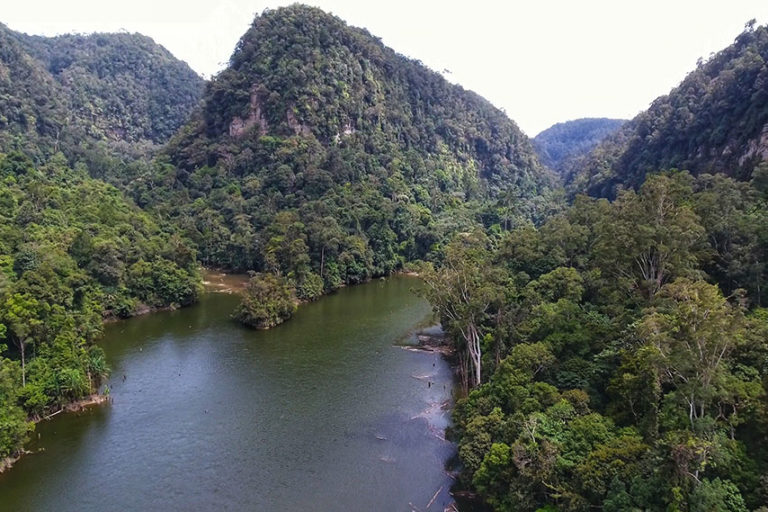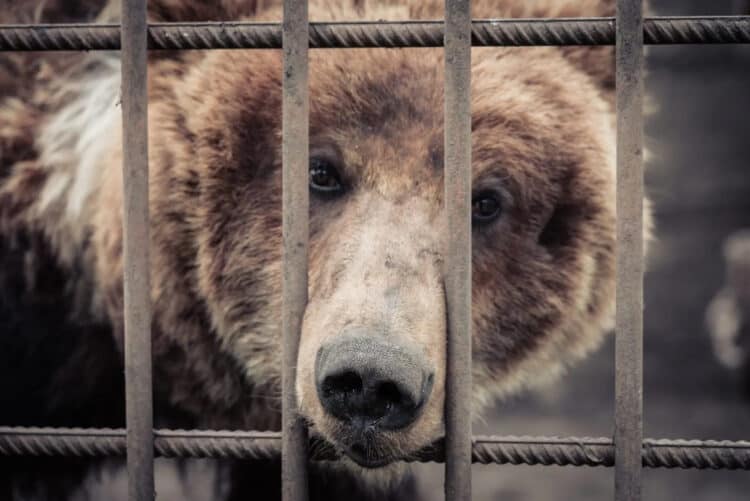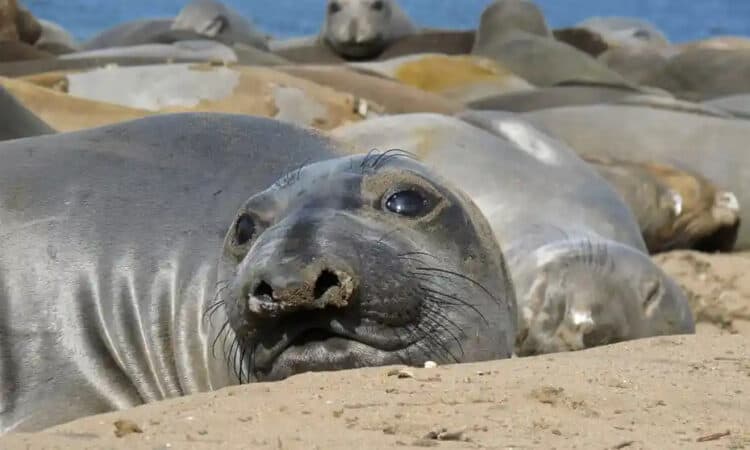JAKARTA — Indonesia’s North Sumatra province, the only known habitat of the Tapanuli orangutan (Pongo tapanuliensis), has proven to be a precarious place for the ape. Just 800 individuals survive in a rapidly shrinking habitat, and the orangutans, which were only described as a new species in 2017, are already listed as a critically endangered by the IUCN.
In recent months, the people involved in efforts to protect these orangutans have also been feeling endangered. Activists fighting a hydropower dam planned for the orangutan’s habitat describe an atmosphere of fear and threats, both subtle and direct.

Indonesia is a dangerous place for activists, and North Sumatra is no exception. In October 2019, the office of a human rights NGO and a coffee shop popular with activists were firebombed in the provincial capital, Medan. Early November saw the grisly murder of two activists-cum-journalists on an oil palm plantation in the province, allegedly by hitmen hired by the plantation owner.
“The tension is high,” says Dana Tarigan, the head of the North Sumatra chapter of the Indonesian Forum for the Environment (Walhi). “In the past, we were only threatened verbally or intimidated, but now the threats are becoming real. And that makes us more cautious.”
Most chilling for activists campaigning against the hydropower dam is the recent death of Golfrid Siregar, a 34-year-old environmental activist and legal aide. Formerly a Walhi staffer, Golfrid resigned shortly before his death to focus on a lawsuit aimed at forcing the North Sumatra government to revoke the environmental permit for the dam being built in the orangutans’ habitat. The lawsuit alleges that a crucial signature was forged during the permit process for the project, known as the Batang Toru hydropower project. In August, Golfrid had also reported three local police officers to the national police for allegedly stopping a related investigation into licensing irregularities.
On Oct. 3, Golfrid was found critically injured on a traffic overpass in Medan. He died three days later in the hospital. Officials ruled the death to be the result of a drunken motorcycle accident. But his friends and family are unconvinced by the explanation: They say he wasn’t a drinker and that his injuries were not consistent with a motorcycle crash. Moreover, they point to death threats made against Golfrid over his activism, which included campaigns against oil palm plantations and sand mines in addition to his work to stop the Batang Toru dam.
While there’s no hard evidence linking Golfrid’s death to his work on the dam, it still sent a chilling message to other activists in the region, says Ronald M. Siahaan, the national head of Walhi’s legal department. Ronald says Golfrid’s death, and the fear it has instilled, has also dealt a blow to the lawsuit against the dam: Another lawyer working on the case has since backed out in fear.
“That’s how scared we are in Sumatra right now,” says Ronald. “These threats have turned out not to be just empty words.”

A controversial project
The dam developer, PT North Sumatra Hydro Energy (NSHE), has denied any involvement in the death threats against Golfrid.
“We’re actually supporting the police to shine light on [Golfrid’s] death so that the dam project won’t be tied to the incident,” says PT NSHE spokesperson Firman Taufick.
The dam, currently under construction and scheduled to start operating in 2022, has been under scrutiny because environmentalists fear it will bring about the extinction of the Tapanuli orangutan by destroying the only forest where it lives.
According to a 2018 study published in the journal Current Biology, the dam would alter at least 8 percent (96 square kilometers or 37 square miles) of the orangutan’s habitat by 2022, further fragmenting an already disjointed population into smaller groups. Scientists say this will increase the chances of problems like inbreeding and accelerate the species’ demise.
PT NSHE, however, says it only holds a permit to work within a 70 km2 (27 mi2) area, and the company will clear less than 6 km2 (2.3 mi2) of forest. The company also argues that a river and a provincial road have already splintered the orangutan habitat.
Despite global concern and ongoing campaigns against the dam’s construction, the project enjoys the government’s full-throated endorsement. It is listed as part of the government’s official electricity procurement plan and has also been given prominent billing as part of the country’s emissions reduction strategy. PT NSHE was even a sponsor for Indonesia’s pavilion at both the 2018 and 2019 U.N. climate talks.
An investigation by leading Indonesian news magazine Tempo into the Dharmawangsa Group, PT NSHE’s majority stakeholder, found that the group has connections in high places. Subroto, the group’s founder, is a former minister of energy and mineral resources. During a graft case unrelated to the dam, another former energy minister, Jero Wacik testified in court that he enjoyed free services from the group’s Dharmawangsa Hotel.
Tempo also tracked connections between PT NSHE and the government of South Tapanuli District, where the dam project is located. The district head, who in 2011 issued a location permit for PT NSHE, is Syahrul Martua Pasaribu. His brother, Panusunan Pasaribu, served as a PT NSHE commissioner from 2012 to 2016. Another brother, Gus Irawan Pasaribu, was the head of the parliamentary commission overseeing energy and environment from 2016 to 2019.
The Batang Toru hydropower project also gained an endorsement from Emmy Hafild, the former head of Walhi who has now become a politician and a member of the National Democratic political party, a part of the President’s ruling coalition. Emmy now serves as an advisor to PT NHSE’s chairman.
The project is also backed by a substantial public relations campaign led by Intermatrix, a firm owned by Wimar Witoelar, the well-connected spokesman of former Indonesian President Abdurrahman Wahid.
But multiple activists and conservationists have told Mongabay that the efforts made by the proponents of the dam go much further than just a PR campaign.

Defamation cases
According to Walhi’s Ronald Siahaan, journalists, activists and academics speaking against the dam have been systematically targeted.
Ronald notes that police reports filed by companies affiliated with the project have resulted in at least two defamation cases, one against a local news outlet and one against an academic.
On June 14, 2019, PT NHSE filed a report against trubus.id, an online environmental publication based in the city of Depok, alleging that trubus.id had defamed the company in two articles published in August 2018 that criticized the project. Rudi H. Paeru, the director of the publication, was summoned by the police in early November.
Onrizal Onrizal, a forestry researcher at North Sumatra University, also faces criminal defamation charges. In 2013, the dam’s developers hired Onrizal to catalog the biodiversity of the Batang Toru ecosystem as part of the environmental impact assessment (EIA) process. Several years later, Onrizal told reporters he discovered that his findings were omitted from the EIA. He also found his signature appended to the final document, even though, he says, he never signed or even reviewed it. This allegation launched the lawsuit led by Golfrid Siregar before his death.
Onrizal was separately reported to the police for defamation in July by A+ Digital PR agency, one of the PR companies hired by PT NSHE. The alleged defamation came in a statement originally published in August 2018 on the website of conservation advocacy group ALERT.
The statement contained a quote from Onrizal, which has since been removed, accusing the PR firm of misleading the public. In July 2019, Onrizal posted a screenshot of the statement to Instagram, prompting the A+ Digital’s director, Myrna Irawaty, to file the police report.
In an interview with Mongabay, Myrna confirmed that she had personally reported Onrizal for defamation, saying the scientist had “caused both material and immaterial damage to our company.”
She added that her report was the extent of the company’s involvement in the matter. “We respect the ongoing legal process and completely entrust this case to the authorities.”

Scrutiny from intelligence
In addition to facing threats of violence and legal action, some conservationists report being monitored by Indonesia’s State Intelligence Agency (BIN)
According to Ronald, BIN officers visited an orangutan rehabilitation center in North Sumatra, which is run by the NGO Foundation for Sustainable Ecosystems, known by the acronym YEL in Indonesian. During the visit, Ronald says, BIN showed YEL staff email exchanges between other YEL employees and Walhi activists. The emails revealed that YEL had provided data that Walhi has used in its campaign against the dam.
“The intelligence members knew about the communication between YEL and Walhi, and they were asking for clarification about the email exchanges,” Ronald said. “So everyone was scared and broke into a cold sweat.”
YEL spokesperson Delfi Saragih declined to comment on the matter, saying she wasn’t aware of any visit by the intelligence agency.
And it’s not just local organizations feeling pressured. PanEco, a Swiss-based NGO that partners with YEL to manage the orangutan rehabilitation center and also does research on orangutans in the Batang Toru area, also got a visit from BIN earlier this year.
In early 2019, international activists began staging protests against the dam, including a series of small demonstrations in London. According to PanEco president Regina Frey, the protests rattled officials. Though Frey says PanEco had no involvement with the London activists, the organization came under scrutiny because the protests were an international event and PanEco is an international organization.
In April 2019, BIN visited the foundation’s environmental education center in Bukit Lawang, North Sumatra. During the visit, Frey says her passport and visa were inspected. “I guess it was primarily to check my document,” Frey says. “There was no consequence. When you do such things [campaigning against the dam project], of course the intelligence is on your back. We are guests in your country.”

Pressure on international groups
While local activists worry about violence, international organizations like PanEco face lesser-but-still-serious vulnerabilities. This reality came into focus in August 2019 after PanEco, which had initially described the dam as “the greatest threat to the long-term future of the Tapanuli orangutan,” announced it had formed a partnership with PT NSHE.
Foreign organizations like PanEco operate only with permission from the Indonesian government, via memoranda of understanding with bodies like the Environment and Forestry Ministry.
These memoranda can be abruptly terminated — as the international conservation NGO WWF recently discovered. On Oct. 5, the environment ministry terminated a two-decade-long partnership with the conservation group, following an internal evaluation concluding that WWF had been overstepping its authority in Indonesia.
PanEco was put on notice that the group could face a similar outcome during a May 6 meeting with eco-activist turned-PT NHSE advocate Emmy Haflid. Frey and Emmy have known each other since the early 1980s, when Emmy worked for an environmental group run by Frey.
The meeting, which took place at a street side durian stall in Medan, was also attended by representatives of PT NSHE and several officials from the environment ministry.
In an interview with Mongabay, Emmy said that during the meeting she reminded Frey that PanEco’s work in Indonesia, and the memorandum dictating the terms of its partnership with the government, could be terminated if the organization and its staff members continued to criticize the dam.
According to Frey, two specific PanEco staffers were mentioned by name: researchers Graham Usher and Gabriella Fredriksson, co-authors of a commentary on the dam published April 2019 in the journal Conservation Science and Practice that named the hydropower project as one of the threats to the survival of the Tapanuli orangutan.
Emmy said speaking out against the dam amounted to campaigning, while PanEco’s memorandum with the environment ministry only allowed the organization to engage in research, conservation, ecotourism and fundraising.
“People said I threatened [Regina]. I didn’t threaten her,” Emmy told Mongabay. “I just reminded her as a friend that this [campaigning] was already outside the activities permitted.”
PT NSHE also denied pressuring PanEco.
“NSHE is always open to inputs and to collaborate with various stakeholders in order to give as much positive impact as possible to the public,” the company told Mongabay. “There’s never pressure given to any parties because we really respect the freedom of speech of every stakeholders.”

Police reports
PanEco staffers Usher and Fredriksson, and their colleague Ian Singleton, were also reported to the police by local community members for campaigning against the dam project.
“They were accused of causing civil unrest, which is a very severe thing to do in Indonesia and probably other countries as well,” Frey told Mongabay. “So that was just like a bomb. This was very threatening. So I was just thinking, How we can appease the situation?”
In addition to the police report, locals also staged a series of protests in front of PanEco office, demanding the deportation of the organization’s foreign staff members. A person familiar with the situation described the protests as “scary,” causing everybody in PanEco to be “constantly worried about what’s going to happen.”
PanEco researchers, including Usher, Fredriksson and Singleton, had worked in Batang Toru for over a decade without previous problems with local residents. Their work figured prominently in the description of the Tapanuli orangutan. However, in May, Frey fired Usher and Fredriksson, communicating the decision by WhatsApp message.
Three months later, PanEco signed a deal with PT NSHE to work together to protect the Tapanuli orangutan and minimize the dam’s impact on the apes. Frey says that teaming up with the developer was the best way to move forward, given the inevitability of the dam and the existence of other pressing threats to the species.
“What’s more detrimental to the ecosystem is the gold mine, which is never mentioned,” she says, referring to the nearby Martabe gold mine operated by PT Agincourt Resources. “It’s a very huge company. There are also palm oil plantations and illegal encroachment.”
She added, “NSHE has given us a lot of indications that this is what they want, to protect the whole place and help us convince the other stakeholders to do something.”
Frey said she knew the deal would be controversial but that she’s willing to risk condemnation from other activists and the loss of donor funding because she believes working with PT NSHE is the best way to help the orangutan. “I don’t care about me being blamed,” she says. “You can’t make decisions based on self-consideration. We want to protect the Batang Toru ecosystem.”

Greenwashing concerns
Primatologist Serge Wich of Liverpool John Moores University describes PanEco’s decision to team up with PT NSHE as “disturbing.” Wich, who has carried out a spatial analysis showing forest loss due to the development of the dam and the power plant, believes the dam is the biggest threat to the Batang Toru ecosystem. And he dismisses the idea that the orangutan is more likely to survive if groups like PanEco agree to work with the developer.
“That’s absurd,” he says.
Wich also said he fears the memorandum with PanEco might play an important role in PT NSHE’s bid to secure funding for the project.
The project is estimated to cost $1.68 billion, and it will be financed by equity and loans. Before the discovery of a new orangutan species was announced, PT NHSE was working to put in place the policies and documentation necessary to apply for loans from funders like World Bank’s International Finance Corporation (IFC) and the Asian Development Bank (ADB).
In response to the groundswell of global concern over the future of the Tapanuli orangutan, the IFC and ADB distanced themselves from the project. And in March 2019, the Bank of China, which is also involved in financing the project, said it had “noted the concerns expressed by some environmental organizations” and would carefully review the project. It has not issued any further public updates, leaving the funding for the project uncertain.
In a recent interview with Mongabay, Hafild confirmed that the project’s funding was in doubt as a result of campaigns against the dam. “With the bad reputation we’ve received, I’m afraid banks are wary,” she said.

While PT NHSE works to burnish its image and secure funding for the dam, activists in North Sumatra face a difficult choice.
Golfrid’s death, coupled with the legal threats connected to the dam project, has deterred some people from the fight against the dam. But others vow to continue campaigning.
“We understand the risks that come with being human rights and environmental activists,” Dana, chapter head of Walhi North Sumatra, says. “We are cautious for sure because the threats are real, but truths still have to be revealed. So we won’t stop.”
This article by Hans Nicholas Jong was first published on Mongabay.com on 18 December 2019.
What you can do
Support ‘Fighting for Wildlife’ by donating as little as $1 – It only takes a minute. Thank you.







Leave a Reply